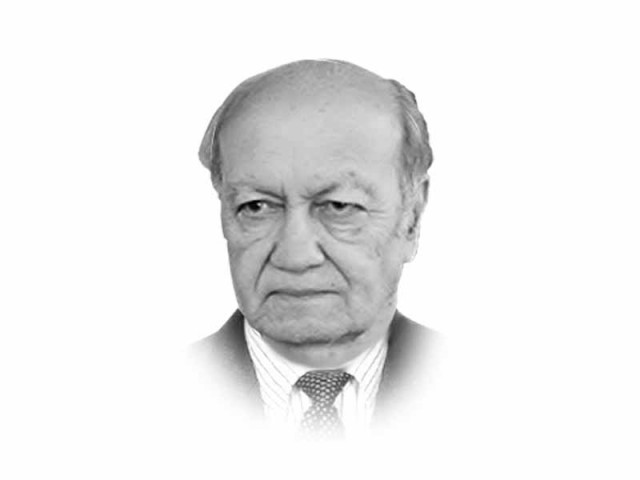Can Pakistan and Afghanistan develop a rational relationship?
the Afghan government’s semi-dysfunctional status poses a dilemma for Pakistan

The writer is a retired lieutenant general of the Pakistan Army and a former federal secretary. He has also served as chairman of the Pakistan Ordnance Factories Board
No doubt, the Afghan government’s semi-dysfunctional status poses a dilemma for Pakistan. Despite these shortcomings, Islamabad should make serious efforts to engage with Kabul on all security and interstate matters. After all, if the rest of the world is engaging with Kabul despite the chaos in Afghanistan we need to do the same and work towards building mutual confidence. Our previous policy of supporting the Taliban has been the primary reason for Kabul’s distrust. It is long overdue that we revise this policy and develop clarity about our relations with the Taliban. The policy of being accommodative towards the Haqqani Network and Shura seems to have become obsolete and as a senior diplomat remarked “poses a clear and present danger.” They are no substitute for a stable relationship with the Afghan government now or in the future. There is no doubt that the Taliban has control of vast areas in Afghanistan and even if they were to capture power, it does not mean that they would be able to hold it for long. After all, we have the recent example of Daesh in the Middle East.
It is a mistaken assumption that to contain Afghanistan, Indian partnership lies in supporting the Taliban. The sound option is to follow the established norms of state-to-state relations. We cannot allow the Haqqani Network to operate in Pakistan. Experience has shown that the Taliban have never shown any compromise unless they are defeated militarily. The Taliban or any of the insurgent groups should not be allowed to use our territory, be it for planning, rest or recreation, except for the purpose of engaging in peace negotiations. In our engagement with the US we have to be candid about our Afghan policy and limitations in influencing the Taliban. Washington should be apprised frankly to what extent we could support them and where we cannot.
There is a growing perception that there is no military solution to the Afghan problem and sooner the US, the Afghan government and the Taliban realise it the better. But the question is would they and when and at what cost. China, and now Russia, could play a role in pressing the Taliban to come to the negotiating table. Both are worried about the growing influence of the Islamic State (IS) in their countries and have developed contacts with Taliban leadership and support them against the IS. So far China’s policy has been cautious and rightly considers Afghanistan a political minefield. However, they would be willing to promote a regional approach for achieving peace in Afghanistan. In the ultimate analysis it is for the Afghan government and the Taliban to find a solution to their problems. If regional countries stop interfering through their proxies, it would facilitate a settlement. The divergent interests of India and Pakistan and also of Iran have so far prevented any moves towards a regional approach. Washington has been supportive of Delhi’s wider role in Afghanistan that conflicts with Islamabad’s position. More so when India uses Afghan territory for subversive activities against Pakistan, the US looks the other way.
Pakistan needs to work more closely with Iran on the Afghan issue. Historically, they have been supporting opposing groups in the conflict adding to the chaos. Cooperative effort in promoting peace in Afghanistan is clearly in their common interest. The government has taken the right step of strengthening the Pakistan-Afghanistan border. Fencing the border and increased patrolling should contribute in reducing militant infiltration. Unfortunately, the Afghan government is opposed to fencing. From its perspective this is tantamount to giving permanence to the Durrand Line as the de jure and de facto international boundary. Normalising governance in Fata is also a prerequisite for achieving effective control on Pak-Afghan border. Mainstreaming Fata is essential for restoring the rights of its people. Since Pakistan’s inception, Fata has been gravely neglected.
As regards the policy on Afghan refugees, it would be unwise for Pakistan to insist on their return. The uncertain conditions and widespread insurgency in Afghanistan demand that we take a more humanitarian approach towards them. Pakistan has borne the burden of hosting millions of refugees for several decades thanklessly. It should manage the problem with grace and in best traditions of Islamic brotherhood. At the same time strict vigilance is essential for ensuring that militant organisations do not use refugee camps as a cover for hostile activity. Despite Pakistan’s support for Afghanistan during the jihad and hosting millions of its refugees, we remain the least liked country by the Afghans. Apparently the reason is Islamabad’s perceived interference in their internal affairs and support of Taliban. There were 1,600 Afghan civilian casualties in the last six months that was an all-time high. This is having a serious impact on the morale of the nation and undermining the confidence of the Afghan army.
The current American policy of increasing its military force by 4,000 additional troops is meant to support the Afghan forces combat effectiveness. It is also meant to give a message that the US is not leaving Afghanistan any time soon and should be an additional incentive for the Taliban to engage in dialogue. Whether the Taliban at this stage would be interested in a negotiated settlement seems unlikely, especially when the insurgency is going in their favour.
Published in The Express Tribune, July 19th, 2017.
Like Opinion & Editorial on Facebook, follow @ETOpEd on Twitter to receive all updates on all our daily pieces.















COMMENTS
Comments are moderated and generally will be posted if they are on-topic and not abusive.
For more information, please see our Comments FAQ